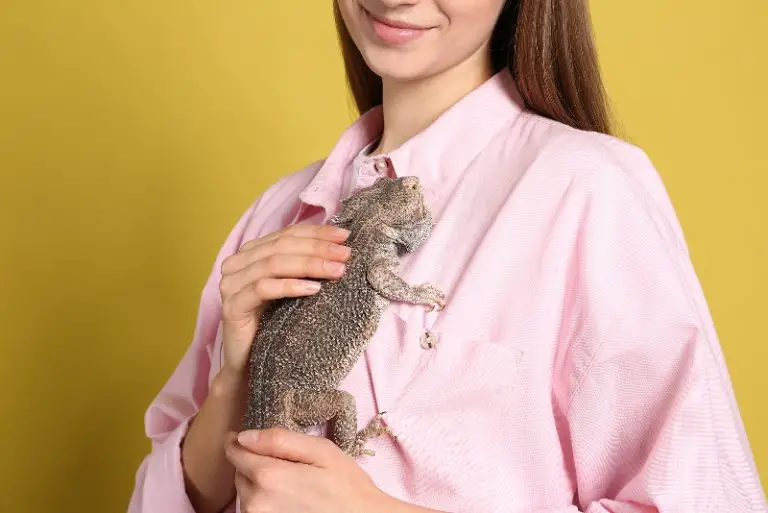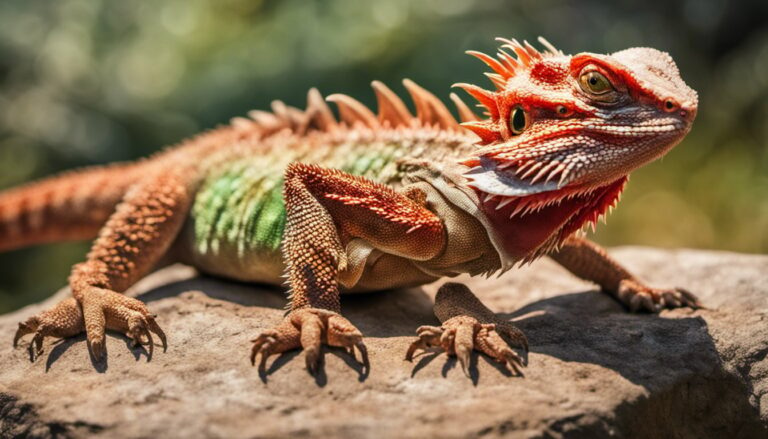Best Insects For Bearded Dragons [Must Read]
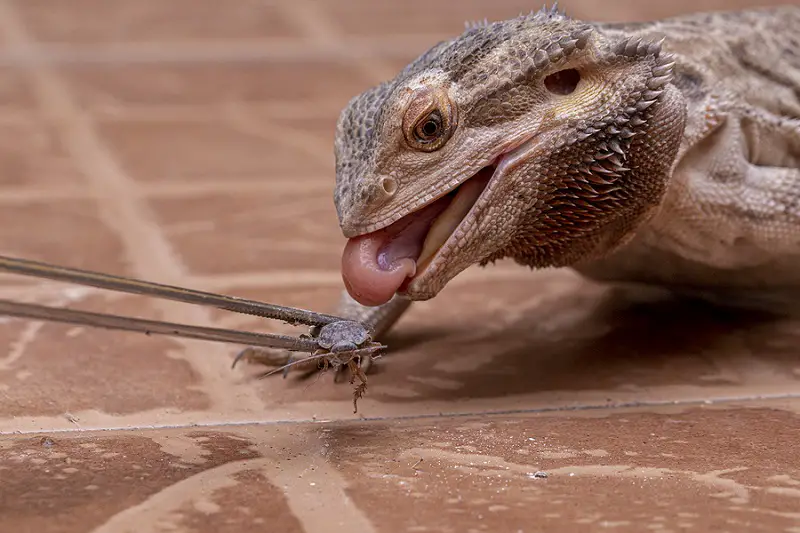
While it may not seem appetizing to us, Bearded Dragons love eating live food, such as insects. Not only are insects tasty to Beardies, but they’re nutritious as well. For example, insects are a staple in a Bearded Dragon’s diet, especially when they’re a baby and juvenile. Insects contain many nutrients to help Bearded Dragons grow and develop.

So, that’s what we’ll discuss in this article. After a brief overview of the Bearded Dragon, we’ll share the nutritional benefits of feeding Beardies insects. In addition, we’ll explain the best staple insects for Bearded Dragons and what insects are best for Bearded Dragons. Finally, we’ll share some tips for preparing and feeding lizards these insects.
Contents
Table of Contents
What Is A Bearded Dragon?
A Bearded Dragon is a type of lizard that anyone would be proud to have as a pet. Beardies are friendly, social, and can bond with their owners. Beardies are a fun companion where you can cuddle with them, play with them, and even watch TV. This reptile initially came from Australia and was brought over to the United States in the early 1990s. They’re used to warmer climates, which is why they need certain lamps for their terrariums.
For instance, during the day, Beardies need their terrarium to be between 75 and 85 degrees F. They’ll also need a basking spot with a UV light that’s between 95 and 100 degrees F. At night, the tank can be cooler, with temperatures between 68 and 74 degrees F.
With this kind of care, your Beardie has a lifespan of about 10-15 years and can grow as long as 24 inches.
Part of their care is a healthy, well-balanced diet. Beardies need certain nutrients to help them grow and develop.
Most of those nutrients come from feeding them live food, such as insects.
Should Bearded Dragons Eat Insects?
Absolutely, Bearded Dragons should eat insects. Insects are a huge staple of their diet and nutrient.
For instance, baby Bearded Dragons need to eat at least 70 to 75% of insects as part of their diet. As they grow older, you can feed fewer insects to your lizard.
However, you should never stop feeding insects to your Beardie. A Bearded Dragon insect diet adds a lot to their growth and development.
Important Nutrition In Insects For Bearded Dragons
Insects provide certain nutrients that Bearded Dragons don’t get from vegetables or fruits. For instance, live food contains protein, calcium, and other vitamins and minerals.
While it might seem gross to us, feeding live insects are important nutritionally and developmentally.
Canned insects do not have as many nutrients in them as live food. In addition, you can gut-load live insects to add more nutrients.
For example, gut loading is when you feed insects, veggies, and supplements that you want your Bearded Dragon to eat. This may be extra calcium, vitamin D, or anything else they lack.
Also, live food mimics the wild for your Bearded Dragon. They’ll have fun “hunting” and “catching” their food, which is great for their mood.
What Insects Can Bearded Dragons Eat?
Believe it or not, there are a good amount of live insects for Bearded Dragons to eat.
So, what insects do Bearded Dragons eat?
- Black Soldier Fly Larvae
- Butterworms
- Cockroaches
- Crickets
- Dubia Roaches
- Earthworms
- Locusts
- Redworms
- Superworms
What Insects Can Baby Bearded Dragons Eat?
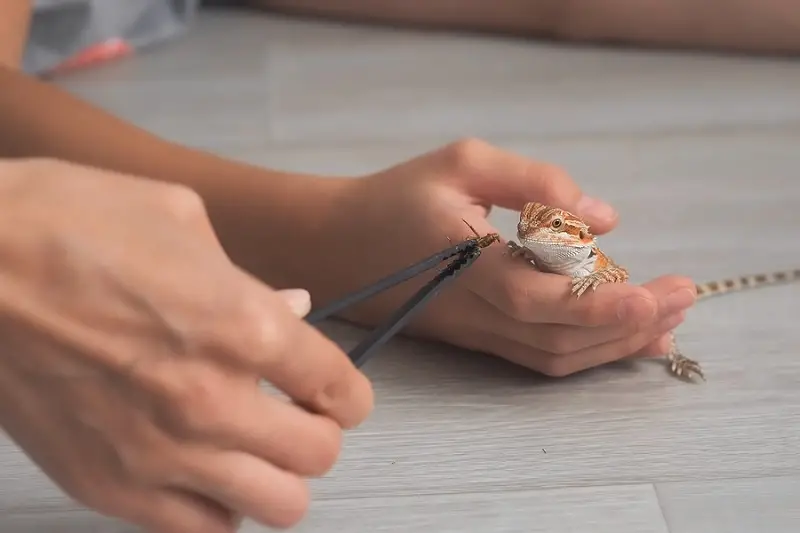
Baby Beardies can eat insects as well. In fact, about 70 to 75% of their diet should be live food. But what are the best insects for juvenile Bearded Dragons?
They can safely eat the following:
- Butterworms
- Fruit Flies
- Locusts
- Pinhead Crickets
- Redworms
- Spiders
- Wax Worms
- Black Soldier Fly Larvae
- Dubia Roaches
For instance, they can eat most of what adult Beardies can eat. However, they need to be smaller insects. If your Beardie is a baby or a juvenile, make sure the bug is smaller than your lizard’s head.
Read more about a baby Bearded Dragon’s diet here.
What Insects Should Bearded Dragons Never Eat?
On the other hand, there are some insects that Bearded Dragons should never eat. It might be because these insects have low nutritional value for them, or they’re toxic and not easy to digest.
Be wary of the insects listed below:
- Fireflies (and other glowing bugs)
- Elderbugs
- Venomous insects (such as bees, wasps, or scorpions)
- Wild insects
- Caterpillars
- Butterflies
- Ladybugs
Some of these insects can make your Beardie extremely sick, possibly resulting in death.
For a quick look at what insects are safe or not, look at the table below.
| Safe For Baby Bearded Dragons | Safe For Adult Bearded Dragons | Not Safe For Bearded Dragons |
| Butterworms | Butterworms | Fireflies (and other glowing bugs) |
| Fruit flies | Cockroaches | Elderbugs |
| Locusts | Locusts | Venomous insects (such as bees, wasps, or scorpions) |
| Pinhead crickets | Crickets | Caterpillars |
| Redworms | Redworms | Butterflies |
| Spiders | Mealworms | Ladybugs |
| Dubia Roaches | Dubia Roaches | Wild insects |
| Wax worms | Superworms | |
| Black soldier fly larvae | Black soldier fly larvae |
Luckily, we’ve compiled a list of some of the best feeder insects for Bearded Dragons.
Watch this video:
10 Best Insects For Bearded Dragons
But what kind of insects do Bearded Dragons eat?
You can feed your Bearded Dragon many different insects or bugs. Some are great to provide daily, while others should only be a treat once in a while.
Worms can be an excellent nutritional source for Beardies, even though they’re not considered insects.
Regardless, here are some of the best insects to feed Bearded Dragons.
Crickets
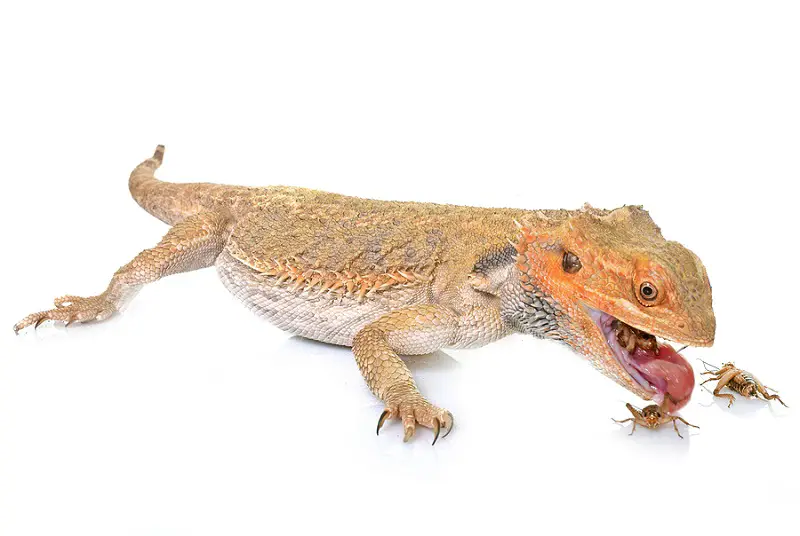
Best For: Daily feeding
Best Parts:
- High in protein and calcium
- Easy to buy from pet stores and affordable
- It can be fed to your Beardie at every life stage
When feeding crickets to your Beardie, take into account your lizard’s age. For example, baby Beardies should eat young crickets since they have a softer exoskeleton. This is easier for them to digest.
As your Beardie gets older, you’ll want to feed them fewer crickets each day since they won’t need to eat as many insects.
Keep an eye on your Bearded Dragon when eating crickets to ensure they eat them well. Also, never leave leftover crickets in your lizard’s enclosure. Any uneaten insects should be removed after 10-15 minutes.
Dubia Roaches
Best For: Daily feeding
Best Parts:
- High in protein, low in fat
- Easy to keep and are quiet
- They breed easily giving you more food for your Beardie
Adult Bearded Dragons can eat three to five dubia roaches per day. On the other hand, baby Beardies can eat anywhere between 25 and 50 per day.
You can sprinkle some supplement powder over the roaches when adding them to your Beardie’s dish.
Alternatively, you can feed gut-loaded dubia roaches to your Bearded Dragon. This means you can provide your roaches with veggies that are rich in vitamins and minerals. Then, when your lizard eats the roaches, they’ll get the same vitamins and minerals.
Goliath Worms (Hornworms)
Best For: Feeding a couple of times per week
Best Parts:
- High in calcium
- Low in fat
- Good source of water
Baby Bearded Dragons can eat goliath worms daily. However, as they grow older, adults should only eat these worms about three times per week.
This worm does have some nutritional value for Beardies, but they’re high in water content. If your lizard is dehydrated, that’s great. However, too much water can cause overhydration and dehydration.
Also, goliath worms grow quickly within a couple of days. They can easily grow bigger than your baby Beardie, so you’ll have to feed this worm to your lizard fast.
Waxworms
Best For: Occasional treat
Best Parts:
- Easy to buy and affordable from pet stores
- Easy to keep in proper storage
- High in protein
While waxworms can be fed daily to your adult Bearded Dragon, it’s best to save this worm as an occasional treat.
For instance, waxworms are high in fat, which can cause obesity issues for your Beadie. Otherwise, your lizard will surely enjoy this treat and gain some protein and water content.
Superworms
Best For: Occasional treat
Best Parts:
- High in protein
- High in water content
- Fun for your Bearded Dragon to chase
It might seem strange that a benefit of this worm is that your Beardie will have fun chasing it. You can place superworms in a shallow bowl where they can’t escape.
Alternatively, you can place them in the terrarium where they’ll roam, and your Beardie will need to “catch” its food.
Not only is it a good snack for your Bearded Dragon, but they’ll enjoy the mental stimulation of hunting it down.
Unfortunately, superworms are high in fat. So, you can feed this daily along with other staple insects, but it might be best to feed it as an occasional snack.
Mealworms
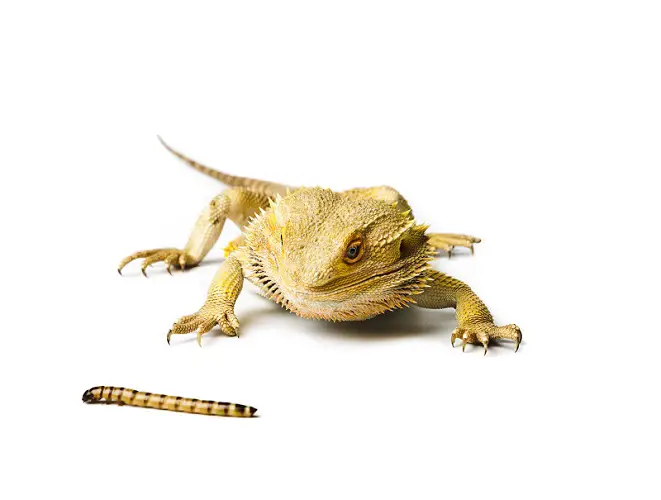
Best For: Weekly feeding
Best Parts:
- High in protein and fiber
- Easy to buy and are affordable
- Easy to maintain and keep
Mealworms are popular with Bearded Dragons. However, they can only be fed once or twice per week to adult Beardies.
For instance, mealworms have a tough outer shell that’s difficult for babies and juveniles to digest. Even as adults, mealworms could cause gut impaction.
Also, mealworms have a higher phosphorous to calcium ratio, the opposite of what they need. However, this worm will be fun to give your Beardie as an occasional treat.
Read more about bearded dragons and mealworms here.
Black Soldier Fly Larvae
Best For: Daily feeding
Best Parts:
- High in calcium and protein
- Easy to care for and maintain
- Good for baby, juvenile, and adult Bearded Dragons
Also known as calciworms, this insect is small, slow, and easy to care for. Your Beardie will be able to eat this with ease.
However, since they are so small, adults will want to eat many of these. Black soldier fly larvae are so rich in calcium that they can even be used as a supplement in addition to other staple food.
Butterworms
Best For: Occasional treat
Best Parts:
- High in calcium and protein
- Easy to purchase and affordable at pet stores
- Makes a great supplement
Similar to the black soldier fly larvae, butterworms are a great source of calcium and protein for adult Bearded Dragons. In addition, butterworms are bigger, so your Beardie will be more enticed to eat them.
However, these worms are high in fat, so they should be fed sparingly or as an occasional treat. Since it’s high in calcium, you can also use butterworms to supplement with other insects.
Silkworms
Best For: Daily feeding
Best Parts:
- Easy for Bearded Dragons to digest
- High in protein and calcium
- Low in fat
If you can find silkworms, they may be expensive to buy at the pet store. However, they are a great source of nutrients for your Bearded Dragon.
In addition, thanks to their soft bodies, silkworms are easy for your Beardie to digest. So you can safely place these worms in your Bearded Dragon’s habitat and know your lizard is getting a tasty treat that’s healthy for them.
Earthworms
Best For: Occasional treat
Best Parts:
- High in calcium and water content
- Affordable from pet stores and reputable bait shops
- Good source of protein
Earthworms aren’t usually a popular option. However, these are part of the insects Bearded Dragons can eat.
These worms are nutritious but should only be given as an occasional treat since it won’t give your Beardie all the nutrients they need.
Before feeding Earthworms to your lizard, be sure to wash them. Whether you get them from a pet store or a bait shop, you’ll want to wash any pesticides off.
Also, if you buy earthworms from a bait shop, ask if they dye the worms before buying. If they do, then purchase the earthworms elsewhere.
Best Insects For Baby Bearded Dragons
Even though insects are super nutritious for Beardies and babies need more live food than vegetation as part of their diet, some insects aren’t safe for baby Bearded Dragons to eat.
For example, baby Bearded Dragons can eat small crickets, dubia roaches, and black soldier fly larvae.
These insects are small enough for baby Beardies to eat and digest safely.
How Many Insects Should A Bearded Dragon Eat?
No matter what age your Bearded Dragon is, they should be fed as many insects as they can consume within 10-15 minutes of each feeding.
However, depending on the age of your Beardie, they may eat more insects or less. For example, baby Bearded Dragons and juvenile Beardies need more insects as part of their diet than vegetation.
For example, you can count on your baby Bearded Dragon eating up to 60 insects per day. Of course, this is spread between three to five meals per day.
In addition, an adult Bearded Dragon may eat up to 30 or 40 insects per day between their meals.
How To Prepare Bearded Dragon Insects
Preparing insects for your Bearded Dragon to eat will depend on the type of live food you feed them.
For example, you’ll want to store the insects safely. You don’t want to feed your Beardie bugs that have died.
Some will be fine kept in a plastic container, while others, such as dubia roaches, will be fine in empty egg cartons.
Also, you can feed the insects as they are or sprinkle supplement powder on them. For instance, if your Beardie needs some extra calcium or vitamin D, you can sprinkle a little powder on the insects, and your lizard will get the supplement.
In addition, there are some insects you’ll need to feed to keep alive longer. For example, worms can be fed various vegetation. Not only will this keep them alive, but it’ll also give them some vitamins and minerals that will pass onto your Bearded Dragon when they eat the bug.
Tips For Feeding Insects To Your Bearded Dragon
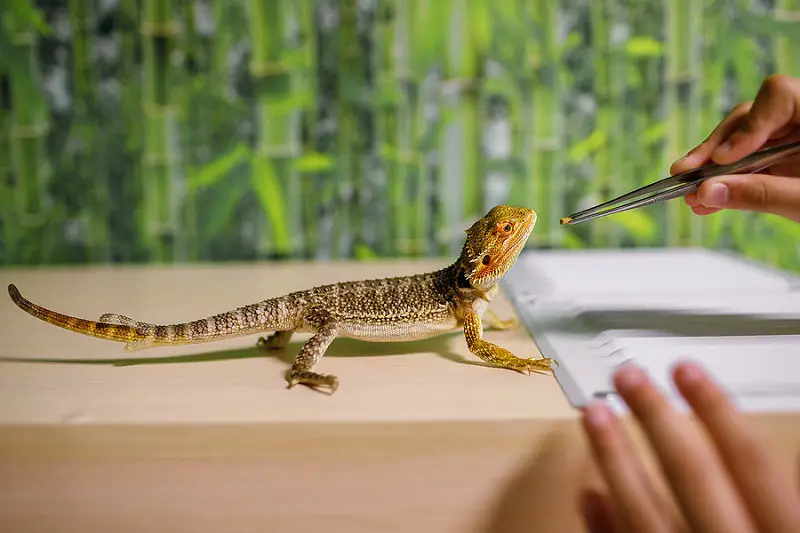
It sounds like it might be a difficult task to feed your Beardie live food. However, there are a few different ways you can feed insects to your Bearded Dragon.
One way is to give it to them one by one and by hand. Or, better yet, use tweezers so your Bearded Dragon doesn’t accidentally bite your finger.
If you have a baby Beardie at home, this is a great method to ensure they’re getting the food they need. In addition, no matter the age, it’s also a bonding moment between you and your lizard.
Another way is to pour the insects straight into the terrarium. Be sure the tank is completely closed so that no bugs can jump out, such as the crickets.
Your Bearded Dragon can then go on a “hunt” and catch its food. It’s a great way to get them moving within their habitat and gives them good mental stimulation.
However, you’ll want to monitor it in case there are any insects your Beardie missed. After 10-15 minutes, remove any insects that hadn’t been eaten. This could be because your Bearded Dragon missed them, or maybe they’re full.
Finally, you can have a feeding dish such as a shallow bowl or plate for your Beardie. A bowl will keep the insects inside, and your lizard can munch on them.
A plate, on the other hand, will keep them contained long enough for your Beardie or eat them. Or the insects may roam, and your lizard can chase after them if they feel inclined to.
Conclusion
What live insects can Bearded Dragons eat? More types than you’d think.
Insects are an important part of your Beardie’s diet. However, if you’re unsure of which insects might be the best option for your lizard, then talk to your vet.
Otherwise, your Bearded Dragons will undoubtedly love the challenge of catching their food.
Also read about the best fruits for bearded dragons, baby bearded dragon’s diet, or exactly what not to feed bearded dragons. Or learn more about Bearded Dragons here.

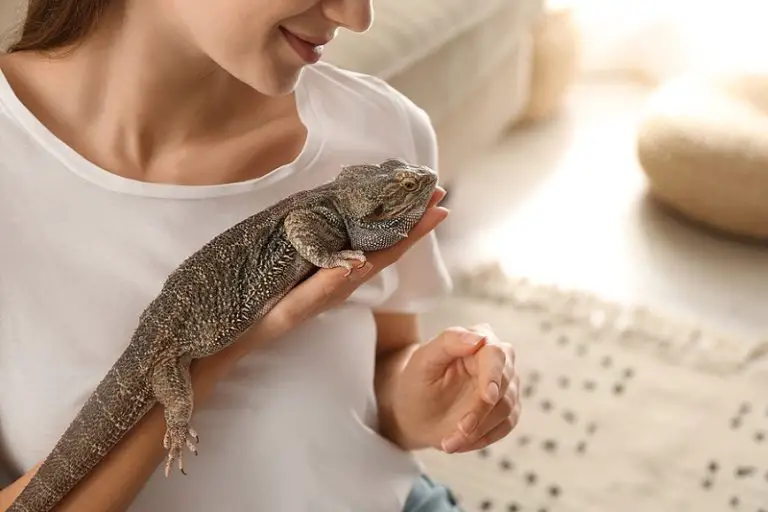
![Are Bearded Dragons Good Pets For Kids? [Full Guide]](https://allourcreatures.com/wp-content/uploads/2021/11/bearded-dragons-and-kids-768x514.jpg)
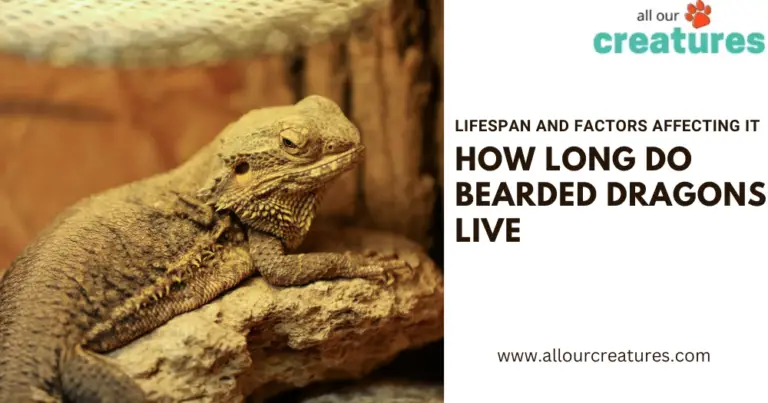
![Best Bedding For Bearded Dragons [Full Guide + Top Options]](https://allourcreatures.com/wp-content/uploads/2021/12/bigstock-Bearded-Agama-latin-Pogona-V-396699188-768x498.jpg)
